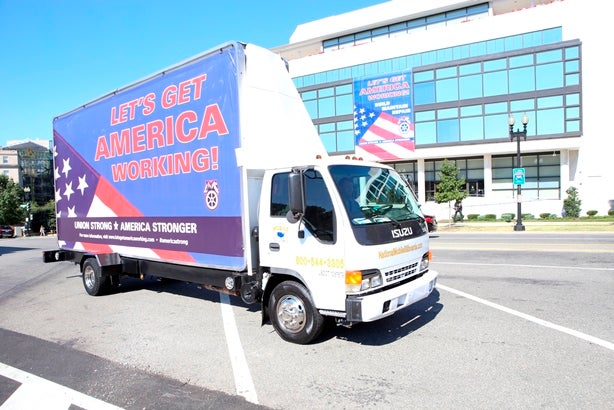News
Progress in Breaking Political Gridlock

For more than a decade, Congress’ failure to approve a long-term transportation spending bill placed infrastructure improvements on the back burner all across the country.
That ended in December, however, when members of the House and Senate united behind a five-year, $305 billion plan to pay for road, rail and mass transit upgrades.
At a time when Capitol Hill is unable to come together on much of anything, a bipartisan collection of lawmakers saw the value in rebuilding America’s highway and rail networks after years of short-term fixes that hampered project planning. That is a win not only for commuters, but truckers and businesses as well. The economy will benefit from an improved flow of commerce.
Teamsters General President Jim Hoffa hailed Congress’ resolve to put aside its differences on many issues and approve legislation that will improve infrastructure and put people to work in good-paying jobs.
“For years, road and rail infrastructure fell into disrepair because some in Congress couldn’t get their act together,” Hoffa said. “But this new funding bill shows what can happen when lawmakers work in a bipartisan fashion to find real answers for hardworking Americans. We applaud this breakthrough and look forward to improved transportation in the years to come.”
Funding Increase
Elected officials have been hamstrung by the fact they couldn’t properly plan for substantial construction because they didn’t know what funding would be. This measure helps transportation planners better prioritize since they know how many dollars will be available.
As Rep. Candice Miller (R-Mich.), a member of the House Transportation and Infrastructure Committee, said, the bill provides “the stability and certainty states and local governments need to understand the large-scale, complex transportation projects that improve and restore our nation’s crumbling infrastructure.”
The measure offers a substantial bump in funding from what was included in an earlier House-passed version of the bill. In addition, it protects motorist safety by rejecting Teamster-opposed provisions that would have removed the ability of the states to implement rest and meal breaks for truck drivers. The bill also wisely stuck with the House’s earlier decision to reject allowing up to 91,000-pound trucks on interstate highways. Additionally, the transportation legislation will include a study of school bus fleet safety.
Let’s Get America Working
In an effort to spur action, the Teamsters in September introduced its “Let’s Get America Working” platform that called on Congress to come together and pass a long-term transportation spending bill, among other things. It noted that working on transportation projects would put thousands to work in construction jobs across the country.
The union stated the needs were significant, as drivers across the country are experiencing longer and longer commutes. The total cost of congestion nationwide was $121 billion in 2011, according to the Texas Transportation Institute. Meanwhile, 2.9 billion gallons of fuel were wasted in congested traffic, which according to the same study costs the average consumer $818 a year.
This legislation is an important step toward that goal. But it can’t end there.
This nation needs to invest in rebuilding its energy and water systems, as well as make sure union members retain their ability to collectively bargain so they can earn a fair wage. Workers need proper training and access to educational opportunities. And pensions and retirement should be secure.
Since 2008, Congress has transferred more than $62 billion from the general fund to keep the Highway Trust Fund afloat, and it has been years since Congress has passed a highway bill more than two years in duration. Meanwhile, infrastructure continued to fail and the safety of those who are working and traveling along the vast system of U.S. roads and rails was being jeopardized.
Infrastructure Investment
But make no mistake; Congress should be congratulated for this major accomplishment.
Infrastructure investment provided an opportunity to break the political gridlock in Washington, and elected officials from both parties made the first move toward rebuilding and repairing the trust between government and workers. Such a move is wise, as the Teamsters stated in their platform.
Infrastructure jobs, unlike those in other sectors, can’t be outsourced. They improve living standards for all Americans, including the men and women who help to repair and maintain roads, bridges, ports, airports and mass transit systems, along with those who earn a living transporting goods and the vast majority of Americans who use our transportation networks every day.
Congress has decided to reinvest in people that have and can continue to make this country great. Better pay that comes from infrastructure jobs will lead to more spending and improve workers’ quality of life. That way everyone wins.